 Petzlover
Petzlover Cabecudo Boiadeiro is originated from Brazil but Formosan Mountain Dog is originated from Taiwan. Cabecudo Boiadeiro may grow 23 cm / 10 inches higher than Formosan Mountain Dog. Cabecudo Boiadeiro may weigh 64 kg / 142 pounds more than Formosan Mountain Dog. Both Cabecudo Boiadeiro and Formosan Mountain Dog has same life span. Cabecudo Boiadeiro may have less litter size than Formosan Mountain Dog. Both Cabecudo Boiadeiro and Formosan Mountain Dog requires Low Maintenance.
Cabecudo Boiadeiro is originated from Brazil but Formosan Mountain Dog is originated from Taiwan. Cabecudo Boiadeiro may grow 23 cm / 10 inches higher than Formosan Mountain Dog. Cabecudo Boiadeiro may weigh 64 kg / 142 pounds more than Formosan Mountain Dog. Both Cabecudo Boiadeiro and Formosan Mountain Dog has same life span. Cabecudo Boiadeiro may have less litter size than Formosan Mountain Dog. Both Cabecudo Boiadeiro and Formosan Mountain Dog requires Low Maintenance.
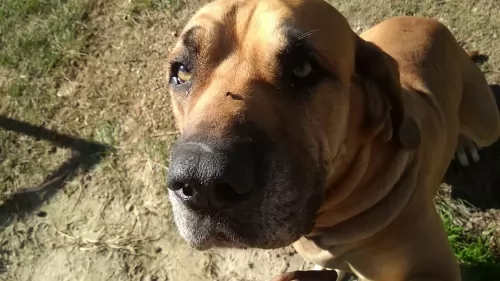 The Cabecudo Boiadeiro has always played an important role in the management of livestock. Stockdogs like this were known in parts of Minas Gerais as early as the 18th century. In fact reports tell us that the Cabecudo has existed since the 16th century as a working dog in the rural parts of Brazil.
The Cabecudo Boiadeiro has always played an important role in the management of livestock. Stockdogs like this were known in parts of Minas Gerais as early as the 18th century. In fact reports tell us that the Cabecudo has existed since the 16th century as a working dog in the rural parts of Brazil.
The Capecudo has remained much the same over the centuries – a dog created as a guardian for large properties, as a game hunter and livestock herder and protector. Today this Molosser dog still drives cattle in Brazil.
 The Formosan Mountain Dog is most often known as the Taiwan dog and it is a landrace indigenous to Taiwan. It is a small to medium breed of dog that was semi-wild at one time. The colonialization of Taiwan and other foreigners help to fully domesticate the Formosan Mountain Dog. They were found to be very trainable and uniquely suited for the terrain around Taiwan. The dogs were easy to train and now serve as hunting dogs, stunt dogs, guard dogs, rescue dogs, therapy dog and personal companions. There are three types of Formosans two smaller types and one medium. However, the original pure Formosan Mountain Dog is getting close to extinction again because the government and people have provided no protection or conservation efforts for them. These dogs have been living in Taiwan in the mountains and were called Formosan Mountain Dogs when Taiwan was known as Formosa. They come from a line of Southeast Asian hunting/gun dogs and they are considered ‘rare’ now.
The Formosan Mountain Dog is most often known as the Taiwan dog and it is a landrace indigenous to Taiwan. It is a small to medium breed of dog that was semi-wild at one time. The colonialization of Taiwan and other foreigners help to fully domesticate the Formosan Mountain Dog. They were found to be very trainable and uniquely suited for the terrain around Taiwan. The dogs were easy to train and now serve as hunting dogs, stunt dogs, guard dogs, rescue dogs, therapy dog and personal companions. There are three types of Formosans two smaller types and one medium. However, the original pure Formosan Mountain Dog is getting close to extinction again because the government and people have provided no protection or conservation efforts for them. These dogs have been living in Taiwan in the mountains and were called Formosan Mountain Dogs when Taiwan was known as Formosa. They come from a line of Southeast Asian hunting/gun dogs and they are considered ‘rare’ now.
According to historian Dr. Sung Yung-yi, the breed went through 4 major catastrophes that affected their development. The first of these was the Dutch Establishment in 1624. The Dutch colonized Taiwan and imported both people and dogs. The dog they brought in was called the Flying Dog and was either Greyhound or Pointer. Eventually, the Flying Dog bred with the Formosan Mountain Dog. This along with the slaughter of dogs belonging to the indigenous people by the government, starting the decline of the original Taiwan dog.
In 1895, it was the Japanese acquiring Taiwan following the First Sino-Japanese War. The Japanese bred the Formosan Mountain Dog extensively with the own Japanese dogs. This further diluted the line and authenticity of Taiwan dogs.
This was followed by World War II when German Shepherds traveled with the US Army and they cross-bred with the Formosan. This was the third major dilution of the Formosan Mountain dog line. At the same time, the Japanese government considered the Formosan Mountain Dog a sanitation threat and barbaric. They massacred them in large numbers in the name of sanitation.
The fourth and final dilution took place during the Kuomintang Era beginning in 1945 with the arrival of the Chinese Nationalist Party. They brought with them the culture of eating dogs. During this time the economy of Taiwan took off and business people began to import their own foreign dogs that were high priced purebreds. These dogs bred with the Formosan and other Formosans were just abandoned to die. The ranks of the breed became very thin indeed. Today’s pure Formosan is highly valuable and extremely rare. Because of all the crossbreeding over the centuries, today’s purebred Formosan Mountain Dog is very different from the Taiwan dog of old. Today’s Formosan is loved all over the island and is a companion and watchdog.
Today there is an effort by Taiwanese ecologists to put together a research project that would study and preserve the Formosan in its indigenous form. Dr. Yung-yi led this effort. He located only 46 dogs with a pure pedigree, 21 females and 25 males. They let the Food and Agricultural of the United Nations know and the dogs were labeled close to extinction. Reproducing from the indigenous dogs to purify and increase the breed was the goal. The government was not very supportive.
Today the Royal Air Force is looking at the Formosan Dog to use for military security. They are currently only using German Shepherds and needed another choice. It was decided that the Formosan Mountain Dog had a better sense of smell, dexterity, alertness, and hearing as well as better padding on their paws.
Through these efforts and those of foundation stock breeders and owners, the Formosan Mountain Dog in its indigenous form was brought back. Some call this dog a purebred Formosan while others consider it a new type. Standards were presented to the FCI for registrations as a purebred. This debate continues today
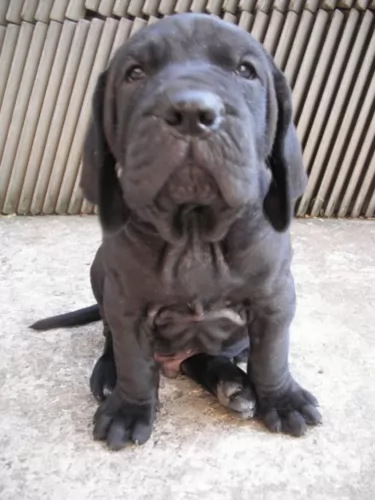 The Brazilian Cabedudo is a strong boned, large dog with a large head and a deep chest. The coat of the dog is short and dense and in wheat-colored shades or fawn shades, while brindle is also in existence. The Cabeçudo Boiadeiro is also known as the Brazilian Mastiff and is a large, imposing dog.
The Brazilian Cabedudo is a strong boned, large dog with a large head and a deep chest. The coat of the dog is short and dense and in wheat-colored shades or fawn shades, while brindle is also in existence. The Cabeçudo Boiadeiro is also known as the Brazilian Mastiff and is a large, imposing dog.
Because the breed was created from a blend of the English Mastiff, the Bulldog and the Bloodhound, not only is this a large dog in height, but a big boned dog as well. He has short to medium length floppy ears and a long tail.
The Brazilian Cabedudo is a courageous dog. When he has been properly trained and socialized, this large dog is capable of becoming an obedient, loving and devoted family pet who is able to get along with children and other pets too. He reserves this gentler side of him for his human family and won’t easily tolerate strangers.
 The Formosan Mountain Dog that was seen during Dr. Sung Yung-yi’s research is a medium-sized dog, athletic and fit. It has a deep chest and a slim waist. The ears are half-covered, the nose is black and there is a coating of black on the tongue. This black tongue is the most distinguishing attribute of the Formosan Mountain Dog. The breed has a strong jaw, the skull that is just slightly longer than the muzzle, which is flat and tapered, triangle face and almond eyes. They have a thick coat and upright, curved tail.
The Formosan Mountain Dog that was seen during Dr. Sung Yung-yi’s research is a medium-sized dog, athletic and fit. It has a deep chest and a slim waist. The ears are half-covered, the nose is black and there is a coating of black on the tongue. This black tongue is the most distinguishing attribute of the Formosan Mountain Dog. The breed has a strong jaw, the skull that is just slightly longer than the muzzle, which is flat and tapered, triangle face and almond eyes. They have a thick coat and upright, curved tail.
The dogs are known to be extremely agile with an ability to hop that is rare in dogs but helps when hunting animals like rats. The Formosan Mountain Dogs hunted in packs with each dog attacking the prey with one bite until it was too exhausted to fight them off any longer.
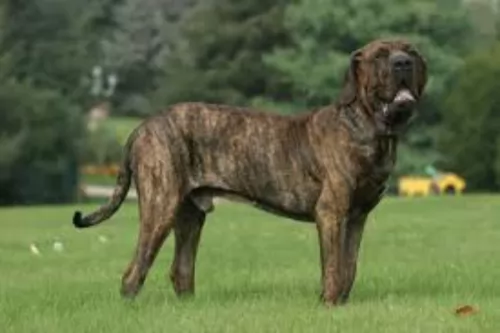 Deciding to become an owner of a dog is a big responsibility, as you are going to have your pet with you for 10 – 15 years at least. There are so many essentials to remember with owning a dog and most dogs are far happier and healthier when allowed to live part of the time indoors with their human family.
Deciding to become an owner of a dog is a big responsibility, as you are going to have your pet with you for 10 – 15 years at least. There are so many essentials to remember with owning a dog and most dogs are far happier and healthier when allowed to live part of the time indoors with their human family.
It's not always easy being a large dog such as the Cabecudo Boiadeiro, as people often assume these mastiff-type dogs are unfriendly and aggressive.
Every dog breed however, is essentially the product of his owners lifestyle and his unique upbringing with them. When this large pet is properly trained and socialized and he is loved and well cared for, he promises to be faithful, devoted, playful and loving – a real friend and protector.
 The Formosan Mountain Dog is very child-friendly. He is affectionate and loyal to his family and protective of his children.
The Formosan Mountain Dog is very child-friendly. He is affectionate and loyal to his family and protective of his children.
He is intelligent and has exceptional hunting skills. He is a good guard dog due to his alertness, but they can be fear-aggressive.
He is very adaptable to living in any location as long as there is somewhere for him to get adequate exercise. He is friendly to people and animals.
He is intelligent and learns quickly.
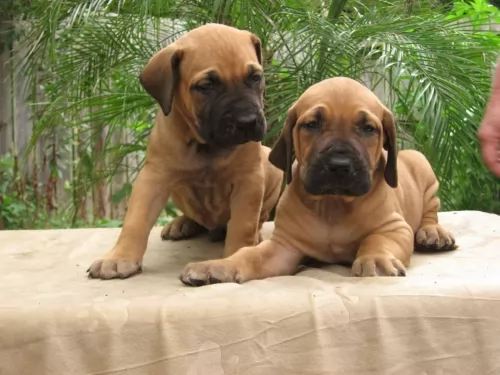 The Cabecudo Boiadeiro is considered a robust breed, used to lots of exercise while herding livestock. With good care and plenty of exercise he can live to 10, 11 or 12 years of age. He is a large breed and this fact alone will ensure that you be aware of some dog illnesses prone to larger breeds.
The Cabecudo Boiadeiro is considered a robust breed, used to lots of exercise while herding livestock. With good care and plenty of exercise he can live to 10, 11 or 12 years of age. He is a large breed and this fact alone will ensure that you be aware of some dog illnesses prone to larger breeds.
This is an orthopedic condition where the hip joints don’t fit properly into the hip joint. Larger breeds such as the Cabecudo Boiadeiro are at a higher risk of getting this orthopaedic disorder.
You’ll see your dog battling to move around and he may not even be able to get up again after lying down. Sometimes a dog might even require surgery. Thankfully, there is testing for hip dysplasia in dogs, and you can ask to see a clearance certificate if you buy your puppy from a so-called reputable breeder.
Progressive retinal atrophy (PRA) is a degenerative eye disorder that can actually lead to blindness in your pet. Night blindness sets in and your dog becomes unsure how to walk in unfamiliar areas, You'll notice that his eyes become gray or cloudy-looking as though there is a film over the eyes. Parent dogs with this eye disease should be spayed or neutered.
 Because there have not been any studies done on the health of the Formosan Mountain Dog, there is not a lot known about any inherent or genetic health issues. It would seem that some bloodlines are healthy, and others have some serious issues. Especially because there are no studies, it is important for breeders to test for eye issues and skeletal issues through the Orthopedic Foundation for Animals and the Canine Eye Registration Foundation.
Because there have not been any studies done on the health of the Formosan Mountain Dog, there is not a lot known about any inherent or genetic health issues. It would seem that some bloodlines are healthy, and others have some serious issues. Especially because there are no studies, it is important for breeders to test for eye issues and skeletal issues through the Orthopedic Foundation for Animals and the Canine Eye Registration Foundation.
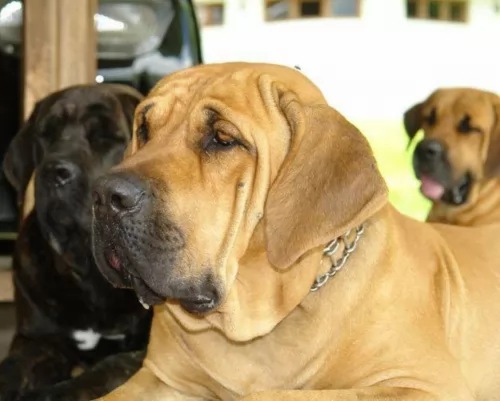 The Cabecudo Boiadeiro is a large breed dog. In spite of his size though, he is surprisingly an active dog. He will need regular exercise such as a brisk walk very day. You can also put aside time to give him some exciting ball games. He is a breed used to working so he will be most unhappy lying around doing nothing.
The Cabecudo Boiadeiro is a large breed dog. In spite of his size though, he is surprisingly an active dog. He will need regular exercise such as a brisk walk very day. You can also put aside time to give him some exciting ball games. He is a breed used to working so he will be most unhappy lying around doing nothing.
If you are going to be feeding your Cabecudo Boiadeiro commercially manufactured good, make sure it is the best quality food. Always go for dog foods which have all the nutrients your large dog requires.
You get wet, dry and raw complete foods and you can give your pet a mix of these. Always make sure that your pet gets some raw meat in from time to time too, otherwise he could battle with skin diseases.
If you aren’t sure how to feed such a large dog, your veterinarian will help you decide which category of food would suit your pet. Clean, cool water is to be provided constantly.
 Feed a high-quality puppy food for medium size dogs at the rate of a ¼ cup twice a day until 8 months then ½ to ¾ twice a day until 12-16 months.
Feed a high-quality puppy food for medium size dogs at the rate of a ¼ cup twice a day until 8 months then ½ to ¾ twice a day until 12-16 months.
1 to 2 cups of high-quality dry food split into 2 meals per day.
Generally healthy breed. Keep clean and watch for mites.
This is an energetic breed and he needs a lot of exercise. He must have at least an hour of exercise daily but the more, the better. He loves swimming and jogging with his people. He’s athletic, smart and agile. He does well with field trials, tracking, agility, and obedience.